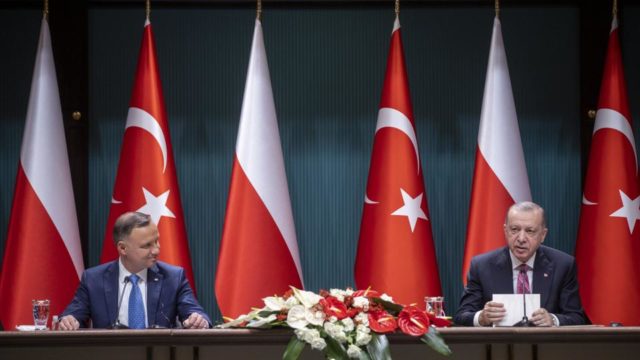
Deepening Polish-Turkish Cooperation
Publication: Eurasia Daily Monitor Volume: 18 Issue: 90
By:

On May 24, a meeting of Polish and Turkish representatives at the highest level took place in Ankara. The two countries’ presidents, Andrzej Duda and Recep Tayyip Erdoğan, were accompanied by ministers and officials from various sectors, including agriculture, culture, and defense. Five bilateral agreements were signed. They included a contract on the purchase by Poland of 24 Unmanned Combat Aerial Vehicles (UCAV) Bayraktar TB2, an agreement on the mutual protection of classified information in the defense industry, a memorandum on agricultural cooperation, and agreements on “safe tourism” and sports cooperation (Prezydent.pl, May 24). The meeting was intended to generate impetus in geopolitical and economic cooperation between two countries. Nevertheless, the impression was that Warsaw was more interested in achieving geopolitical goals, whereas Ankara emphasized the economic character of the meeting.
As declared by both presidents, the two countries are determined to increase their commercial exchange. Since food products account for a large portion of Poland’s total exports—in 2020, their share was 14.3 percent—the memorandum on agricultural cooperation raised some hope in Warsaw (gov.pl, 2021). Turkey remains an untapped destination for Polish farm products as Warsaw seeks to diversify export destinations after Russia imposed a ban on EU food imports.
Moscow is also a critical factor in the Turkish tourism sector. Russian tourists make up Turkey’s top arriving foreign visitors by nationality, with more than 7 million visiting Turkey in 2019, before the Covid-19 pandemic (ktb.gov.tr). Nevertheless, on April 15, Moscow imposed restrictions on air travel to and from Turkey, officially in reaction to the rise of Covid cases in the country. The decision, however, was announced only two days after the meeting between Erdoğan with his Ukrainian counterpart Volodymyr Zelensky in Istanbul and seemed to have had a political character (Carnegie Endowment, May 10). On June 1, the restrictions were prolonged for another 21 days.
Even though economic cooperation was an essential subject of the Erdoğan-Duda meeting, geopolitics was the driving force behind the Polish-Turkish discussions, certainly from the Polish perspective. The purchase of Bayraktar UAVs reverberated most widely among Polish commentators. Even though Poland’s Armed Forces lack drones of this class, buying 24 Turkish UAVs based on non-tender procedures was unexpected. For the first time, Poland’s Minister of Defense Mariusz Błaszczak informed about this step in an enigmatic post on Twitter, only five days before his visit to Ankara (Twitter, May 19).
The Polish ministry of defense runs several modernization programs, such as ORLIK, WIZJER, GLADIUS, GRYF, and ZEFIR, to purchase UAVs of various classes (Sejm.gov.pl, February 2). GRYF and ZEFIR, which cover combat drones, were announced in 2015. The ministry of defense informed that there were ongoing negotiations with the US and Israeli producers for the purchase of combat drones (Polska Zbrojna, February 20, 2015). Even though the new government established some procedural changes, it generally continued negotiations with the US and Israeli counterparts (Defence24, July 19, 2016). Speculations in 2018 suggested that two offers were given consideration: the Israeli-produced Hermes 900 and the MQ-9 Reaper by a US manufacturer (Defence24, July 24, 2020). However, no significant progress has been made so far. In one of his most recent interviews, Mariusz Błaszczak said that the purchase of Bayraktar was not part of any of these programs. He also explained that the contract with Turkey resulted from the Polish Armed Forces’ urgent need for such drones and that the contract will be completed in 2024 (Defence24, June 1). Therefore, Poland became the first NATO ally to buy Turkish Bayraktar UAVs. That was crucial for Ankara, whose relations with some NATO members, most notably the US, have been tense for some time.
Despite the real need for combat drones by Poland’s Armed Forces, buying the Turkish-developed ones was primarily based on political rather than military logic. Unquestionably, the current Polish government has made arms purchases a function of bilateral relations with its partners. It became evident after the cancellation of the French helicopter Caracal deal and after intensified cooperation with the US in that field. Dissatisfied with the first months of US policy under President Joe Biden, Poland is eager to seek alternatives and send a clearer message to Washington. It is noteworthy that the Polish Minister of Foreign Affairs, Zbigniew Rau, visited China on May 29 (MSZ, May 29), which is most probably a part of Poland’s communication strategy.
Warsaw’s long-term strategy has been to internationalize the security of NATO’s Eastern Flank. Despite its second-largest military potential among NATO Allies, Turkey was not contributing significantly to the region’s most critical initiatives. Participation so far has included Turkey leading the NATO Very High Readiness Joint Task Force, on duty since January 1, 2020, and preparations to sendF-16 fighter jets to the Enhanced Air Policing mission for the first time since 2006. Poland is eager for greater Turkish engagement in the region. In April 2020, Jacek Czaputowicz, then Poland’s foreign minister, emphasized after the trilateral meeting with his Romanian and Turkish counterparts that Poland, Romania and Turkey are three pillars of NATO’s Eastern Flank, trying to open the concept also for new actors (Polish Press Agency, April 28, 2020). During the recent joint press conference with president Erdogan, president Duda announced that the Polish-Romanian-Turkish platform for cooperation would be elevated to the presidential level (Prezydent.pl, May 24).
The “new Polish multilateralism,” a recent adjustment in foreign policy, creates opportunities but at the same time might carry some risk for Warsaw. After Joe Biden exempted Nord Stream AG and its CEO Matthias Warnig from US sanctions, Warsaw is waiting with uncertainty on the results of the upcoming Biden-Putin summit in Geneva in mid-June.



